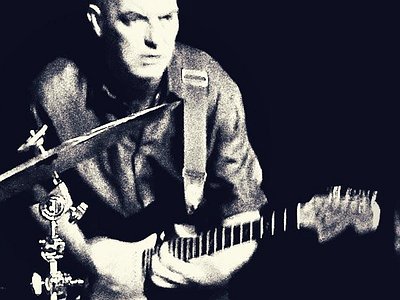Name: Dave Tucker
Nationality: British
Occupation: Guitarist, improviser
Current release: Dave Tucker joins Mark Sanders, Pat Thomas, and Thurston Moore for Educated Guess Vol. 2 on 577.
[Read our Mark Sanders interview]
When did you first start getting interested in musical improvisation?
With the first group I was in, called Mellatron, when i was about 14 years old. We could not really play our instruments but we carried on anyway.
Which artists, approaches, albums or performances involving prominent use of improvisation captured your imagination in the beginning?
Manchester in the North of England had great libraries where you could borrow records. So I was able to listen to a wide variety of music including improvised.
Also listening to Zappa & Velvet Underground pointed the way and hearing Topography of the Lungs by Parker, Bailey & Bennink was a game changer for me.
Focusing on improvisation can be an incisive transition. Aside from musical considerations, there can also be personal motivations for looking for alternatives. Was this the case for you, and if so, in which way?
I was not happy with just doing renditions of my songs and relished the risks that a musician takes when improvising.
How would you describe the shift of moving towards an improvisation based practise, both as a listener and a creator?
For me, very natural. Not having formal musical training, I adopted a lot of bad practises, one of which was messing about which in turn became improvisation, of sorts.
What, would you say, are the key ideas behind your approach to improvisation? Do you see yourself as part of a tradition or historic lineage?
I guess the non-idiomatic approach that Derek Bailey came up with.
In all the groups I work with, there is no plan before we start or no discussion except with London Improvisers Orchestra. Also, when you have performed with people over the years, you develop an understanding of their language.
What was your own learning curve / creative development like when it comes to improvisation - what were challenges and breakthroughs?
For me, shedding the tropes I had used before.
I love free jazz but can’t play jazz. So leaving that behind was useful. I attended workshops by Violinist Phil Wachsmann in the late 80’s and that helped me a lot
Tell me about your instrument and/or tools, please. How would you describe the relationship with it? What are its most important qualities and how do they influence the musical results and your own performance?
Well … some would say the electric guitar isn’t really an instrument. I am not precious about guitars, been through a fair number of them.
As long as it works OK, I’m happy.
Can you talk about a work, event or performance in your career that's particularly dear to you? Why does it feel special to you? When, why and how did you start working on it, what were some of the motivations and ideas behind it?
I guess my work with LIO as there is a shared philosophy. But mostly I play in “Alan Tomlinson Trio” as well as “Scatter” and more recently with “Educated Guess”. Most other stuff I do is quite ad-hoc.
How do you feel your sense of identity influences your collaborations? Do you feel as though you are able to express yourself more fully in solo mode or, conversely, through the interaction with other musicians? Are you “gaining” or “sacrificing” something in a collaboration?
I work better in collaboration. I have performed solo many times but do derive more satisfaction working with others.
For you personally, how would you describe the relationship between a clear individual vision and cooperative results?
Well, if you have a determined outcome then you try your hardest to make that happen. But, as I stated, I prefer the company of others.
Derek Bailey defined improvising as the search for material which is endlessly transformable. Regardless of whether or not you agree with his perspective, what kind of materials have turned to be particularly transformable and stimulating for you?
I see myself as a dynamic improviser. There are lots of different approaches and attitudes to playing.
I love to invent something rather than muddle through something so the dynamic elements of what I do come to the fore.
Nik Bärtsch reduced the art of musicianship to three principles: 1) Listen! 2) Only play the essentials 3) Make the others sound good. What's your take on this and how do these principles pan out in practise?
I don’t start out with any hard and fast rules. I like to be surprised byt what happens. But listening is always a must.
In a live situation, decisions between creatives often work without words. How does this process work – and how does it change your performance compared to a solo performance?
Like I said, I never discuss or plan anything. Same with solo work. But I find that harder.
There are many descriptions of the ideal state of mind for being creative. What is it like for you? In which way is it different between your solo work and coollaborations?
I try to avoid music on the day I perform. Which looks a bit rude when I walk out on the support artists so I can clear my head before I play ... same for soloing.
How do you see the relationship between sound, space and performance and what are some of your strategies and approaches of working with them?
Acoustics are important. Some venues have lousy acoustics but you have to work with what you have.
In a way, improvisations remind us of the transitory nature of life. What, do you feel, can music and improvisation express and reveal about life and death?
For me improvisation is my main source of self-expression.
I believe being a “creative” musician is important for good mental and psychological health. I am happy when people enjoy what I do - but that is not the reason why I do it.




